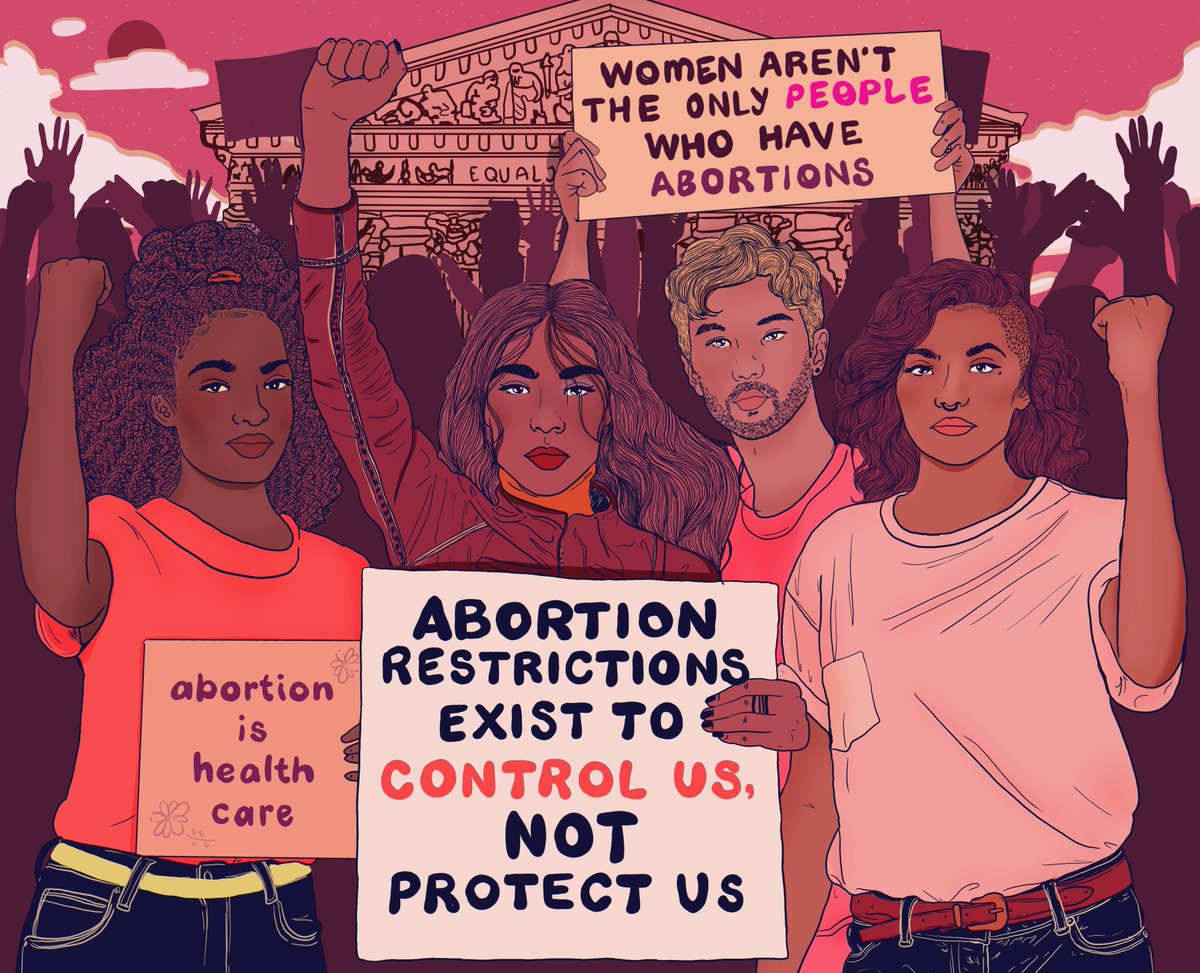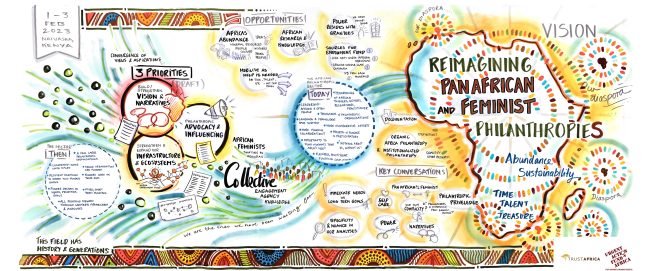The struggle for reproductive justice has been at the forefront of much activism recently – especially in the year after the U.S. Supreme Court decision restricted abortion rights in America. Yet this struggle is not a new one.
It is crucial to view abortion within the framework of social justice, recognising that it is intricately tied to the liberation and autonomy of our bodies and territories. This understanding recognises that abortion justice is part of decolonisation, which acknowledges the historical control, oppression, and exploitation that our bodies and territories have endured as a result of colonisation and imperialism that built racist, ableist, patriarchal and anti-queer systems.
As Marevic Parcon expands: ‘The opposition to abortion rights is rooted in an anti-rights, anti-gender agenda based on patriarchy and misogyny. The same groups that oppose the fulfilment of people’s rights and freedoms are often at the forefront of supporting regulatory measures against sexual and reproductive health and bodily autonomy. These groups can be observed within the halls of the United Nations, using human rights language to distort data and manipulate narratives regarding abortion rights. The direct consequence of the regression in the United States is the empowerment of the opposition, as the ideological shift has provided them with a justification to oppose abortion rights. Furthermore, they are also leveraging this to intensify their opposition to sexual and reproductive health and rights. This includes efforts such as the criminalisation of same-sex sexual conduct, implementation of anti-trans policies, and hindering comprehensive sexual education (CSE).’
These systems manifest at every level: from the imposition of restrictive laws that infringe upon our autonomy to make decisions about our bodies to those that involve giving birth, accessing gender-affirming care, seeking refuge, or even migration. Extend to the erasure of the historical role that activists in majority countries have played in the ground-breaking discovery of a drug that could be used for abortions, to the permissive stigmatisation perpetuated through misinformation campaigns surrounding abortions, sexual and reproductive health, gender orientation and identity. And, the lack of resources to support abortion care and accompaniment, coupled with the persecution and threats faced by abortion rights activists globally.
Within this context, Laura Vergara describes: ‘the fight for abortion justice becomes inseparable from other struggles for gender justice, racial justice, economic justice, disability justice, and LGBTQ+ rights. Recognising the interconnectedness of these movements allows us to transcend fragmented approaches that fail to address systemic oppression. We must commit ourselves to dismantling these systems of oppression collectively, as Audre Lorde expressed: ‘In our world, divide and conquer must become define and empower.’
As we reflect on the one-year mark since the United States’ rollback of abortion rights through the reversal of Roe v. Wade, it is crucial to acknowledge that, while devastating, it is not unexpected – but rather part of a broader agenda driven by anti-human rights and fundamentalist religious movements in the country. These movements wield enormous financial resources, amounting to over $6 billion, enabling them to push forward the colonial and imperialist legacy that seeks to control the autonomy of our bodies and territories worldwide. Their motivations are deeply rooted in financial gain and profit.
Aditi Pinto expands: ‘…there are powerful forces out there, devoid of reflection, that keep morphing into more unbelievable forms: ranging from pharmacists to religious leaders to naturalism believers, all versions of a world that wishes to control or profit off other people’s bodies.’
The fundamentalist religious movements operate within a framework that replicates and continues historical patterns where religion has been used as a tool of control and domination, such as we explicitly can reflect on across Latin America. By leveraging their financial strength, they perpetuate systems of oppression, particularly targeting racialised and marginalised communities. This aim is to accumulate power and wealth through the regulation and control of bodies.
‘The doctrines and strategies employed by these fundamentalist religious movements are not confined to the United States but exported globally through a highly networked fundamentalist movement across the world with significant funding. We have witnessed the impact of their efforts in countries such as El Salvador, Poland, Uganda, and numerous others. Recognising and exposing the colonial and imperialist dimensions of these attacks on abortion justice is crucial to understanding the broader power dynamic at play. It underscores the urgency for intersectional and global solidarity in the fight for abortion justice.’ highlights Vergara.
‘We recognise that while the opposition is not a homogenous entity, they all possess ample funding and organisation. Therefore, we require support not only to effectively challenge the opposition but also to ensure that the prevailing narratives reflect the experiences of individuals facing abortion stigma and discrimination. It is essential for us to receive support in working together in solidarity to hold those in positions of responsibility accountable, thereby ensuring that all individuals receive the vital abortion care and support they need,’ describes Parcon.
By understanding the intricate connection between abortion justice, social justice, and the colonial and imperialist agenda working against these efforts, we can foster a collective movement that challenges and dismantles systemic oppression and exploitation. It is through this intersectional and globally connected approach that is grounded in solidarity, creativity, and centred on the needs and demands of the communities most impacted that we can truly bring about abortion justice.
The resistance and persistence of abortion justice movements
Abortion justice movements are at the forefront of vital reproductive justice efforts as well as advancing every social justice cause. Their work is grounded in the interconnection between abortion rights and every collective struggle for social justice, liberation, and autonomy. With minimal to no funding, these movements are resisting and persisting – ensuring access to abortion care and accompaniment across borders, building and implementing critical campaigns to bust abortion stigma, and providing protection and support to those facing persecution. As Mariana González Cedar shares: ‘…the fearless commitment of abortion care networks, workers, providers, acompañantes, doulas, nurses, midwives, activists, and artists across the world that fills us with hope. People that day after day show up to support their community and often face hostile environments with reinforced commitment and extra love and care for each other and people seeking abortions.’
These global and diverse movements for ‘…abortion rights are currently engaged in a struggle for universal access to healthcare and the recognition of abortion as a fundamental human right. The goal is to ensure that individuals who need to terminate unwanted pregnancies can do so without facing stigma and with the support of society.
‘Central to this fight is the social decriminalisation of abortion, which entails eliminating judgment and condemnation of reproductive decisions. It involves fostering an environment where even those who personally disagree with abortion can understand and empathise with the circumstances of others, providing social support and companionship. In this perspective, borders lose their significance as international solidarity is being built to secure the collective right to abortion. Today, networks that offer support for self-managed, safe, and home abortions have emerged as a vital feminist revolution, transforming cultural norms and challenging the existing structures of power. It is these Mexican networks of accompaniment that are today accompanying self-managed abortions [across and beyond borders], providing all the resources to women and people with gestational capacity in the restrictive states of the United States and other countries of the world to guarantee their right to abortion, accompanying them without stigma and in a safe way, challenging the patriarchal system and resisting, because when the law is not right, civil disobedience is the answer,’ says Verónica Cruz Sánchez.
Breaking down abortion stigma requires our unwavering commitment and work, including in the way we talk about abortions, the narratives we promote, and the stances we take to support it, particularly for those in positions of power. Aditi Pinto writes: ‘Abortion movement building work, such as the acompañante networks, have highlighted how stigma springs from within all of us, and the work to break it is a constant activity of self-reflection.’
To effectively embark on this transformative journey, it is crucial to foster open dialogue and collaboration, grounded in trust and solidarity. As Mariana González Cedar emphasises: ‘Looking to cross-border projects, global collaborations, and leaning into the relationships we have built across the globe is the best way to avoid colonial practices that place the needs of one place over another. We encourage abortion organisations to be aware of the relationships with activists across borders and how to appropriately create security for your community without hollowing out the reserves of another. Our hope is placed in the deep knowledge that our work has always been better together, and now more than ever, it is important to see that connection and choose ‘both/and’ and not fall into binaries of ‘either/or.’
Sustaining this journey and efforts for abortion justice, the decolonialisation and liberation of our bodies and territories, requires deep and long-term commitment and creative organising that meets the needs and demands of those at the forefront of the abortion justice movements. ‘We must not be polarised or believe that the world towards a world without abortion stigma will come about without deeply reflective and transformative self and community work, at the same time, we must care for ourselves and each other as we walk this long journey.’ Aditi Pinto
Transformational funder solidarity now!
Funders need to learn from and embrace the transformational solidarity of the abortion justice movements, moving with the same creativity, resilience, and speed needed for this moment. We share these key recommendations for funders who are supporting social justice efforts and recognise the inherent connection of abortion justice with every single human right.
- Recognise abortion justice as a central social justice effort and its interconnection with every social justice cause furthering human rights. We strongly urge funders to demonstrate their commitment by moving resources and advocating for other funders to do the same while endorsing pledges linked here and here, solidifying their support for this critical movement.
- Honour and listen to the leadership of the abortion justice movements. This includes supporting their needs and demands, and ensuring that they are participating and shaping key decision-making spaces.
- Provide flexible, long-term, and trust-based funding to advance abortion justice efforts. This entails supporting grassroots organisations and collectives at the forefront of the movement, including accompaniment networks operating across countries and regions, and collaborating beyond borders. Additionally, consider supporting feminist funds that redistribute resources to abortion justice initiatives worldwide – click here to learn more about the feminist movements and funds.
- Promote collaboration, community building, and diversity within the abortion justice movement. Instead of focusing on differences between organisations or groups, prioritise the collective work that complements and supports the movement as a whole. Encourage and sponsor in-person gatherings that foster knowledge sharing, mutual support, and a sense of camaraderie. Such gatherings are particularly crucial in abortion justice work, where trust-building is paramount due to the risks and persecution faced by those involved.
- Acknowledge the role of abortion stigma and support efforts to bust it, particularly through narrative transformation. Support holistic strategies that go beyond legal efforts, encompassing art, awareness campaigns, education, and other initiatives that challenge societal perceptions and foster a more compassionate and understanding approach to abortion.
Aditi Pinto serves as inroads’ Programs and Connections Director. Laura Vergara is a cuir (queer) Colombian feminist activist sprouting collective action through the power of storytelling. Mariana González Cedraro serves as inroads’ Communications Manager. Marevic Parcon is the Executive Director at Women’s Global Network for Reproductive Rights. Nicky Spencer Coker, Esq, is Senior Legal Advisor at Purposeful, an Africa-rooted global hub for girls’ activism and resourcing young feminists. Verónica Cruz Sánchez is a Feminist activist and Founder of Centro Las Libres de Información en Salud Sexual Región Centro AC.




Comments (0)
This is a real eye-opener for me. As a transwoman i'm still in the crossroads of identity search. I wasn't aware of the deep statist roots of the anti-abortion campaign. Of course i believe in Mother-Father God but not in the sexist way the religions teach, but rather in a very compassionate and understanding way and i believe that's got to be the true Jesus who would have to be on our side. Who ever understood Wymyn more? This is a major paradigm shift for me and i appreciate Your opening these insider views to people like me and many others! Thanks again
That is all the helpful information I needed. I appreciate you sharing.